Related Research Articles

The King James Version (KJV), King James Bible (KJB), Authorized Version (AV), or originally 1611 King Iames Version is an Early Modern English translation of the Christian Bible for the Church of England, which was commissioned in 1604 and published in 1611, by sponsorship of King James VI and I. The 80 books of the King James Version include 39 books of the Old Testament, 14 books of Apocrypha, and the 27 books of the New Testament. Noted for its "majesty of style", the King James Version has been described as one of the most important books in English culture and a driving force in the shaping of the English-speaking world.
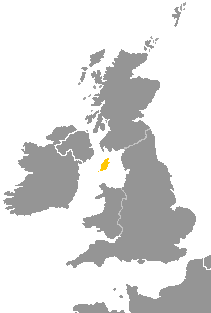
Manx, also known as Manx Gaelic, is a Gaelic language of the insular Celtic branch of the Celtic language family, itself a branch of the Indo-European language family. Manx is the historical and minority language of the Manx people.
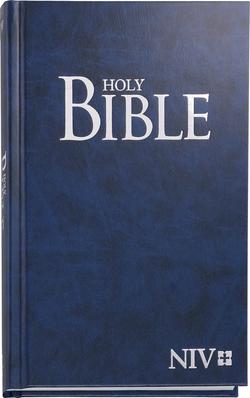
The New International Version (NIV) is a translation of the Bible into contemporary English. Published by Biblica, the complete NIV was released in 1978 with a minor revision in 1984 and a major revision in 2011. The NIV relies on recently-published critical editions of the original Hebrew, Aramaic, and Greek texts.
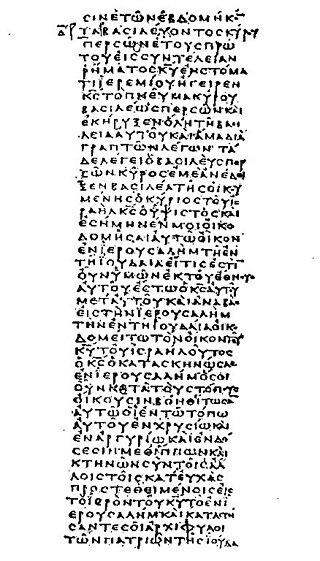
The Septuagint, sometimes referred to as the Greek Old Testament or The Translation of the Seventy, and often abbreviated as LXX, is the earliest extant Greek translation of the Hebrew Bible from the original Hebrew. The full Greek title derives from the story recorded in the Letter of Aristeas to Philocrates that "the laws of the Jews" were translated into the Greek language at the request of Ptolemy II Philadelphus by seventy-two Hebrew translators—six from each of the Twelve Tribes of Israel.

The Revised Standard Version (RSV) is an English translation of the Bible published in 1952 by the Division of Christian Education of the National Council of the Churches of Christ in the USA. This translation itself is a revision of the American Standard Version (ASV) of 1901, and was intended to be a readable and literally accurate modern English translation which aimed to "preserve all that is best in the English Bible as it has been known and used through the centuries" and "to put the message of the Bible in simple, enduring words that are worthy to stand in the great Tyndale-King James tradition."

The Douay–Rheims Bible, also known as the Douay–Rheims Version, Rheims–Douai Bible or Douai Bible, and abbreviated as D–R, DRB, and DRV, is a translation of the Bible from the Latin Vulgate into English made by members of the English College, Douai, in the service of the Catholic Church. The New Testament portion was published in Reims, France, in 1582, in one volume with extensive commentary and notes. The Old Testament portion was published in two volumes twenty-seven years later in 1609 and 1610 by the University of Douai. The first volume, covering Genesis to Job, was published in 1609; the second, covering the Book of Psalms to 2 Maccabees plus the three apocryphal books of the Vulgate appendix following the Old Testament, was published in 1610. Marginal notes took up the bulk of the volumes and offered insights on issues of translation, and on the Hebrew and Greek source texts of the Vulgate.
The Darby Bible refers to the Bible as translated from Hebrew and Greek by John Nelson Darby.

Literature in the Manx language is known from the 16th century. Early works were often religious in theme, including translations of the Book of Common Prayer, the Bible and Milton's Paradise Lost. Edward Faragher, who published poems, stories and translations, is considered the last major native writer of the language. The historian A. W. Moore collected traditional Manx-language songs and ballads in publications towards the end of the 19th century.
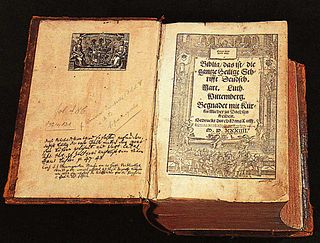
The Luther Bible is a German language Bible translation by the Protestant reformer Martin Luther. A New Testament translation by Luther was first published in September 1522, and the completed Bible, containing a translation of the Old and New Testaments with Apocrypha, in 1534. Luther continued to make improvements to the text until 1545. It was the first full translation of the Bible into German that used not only the Latin Vulgate but also the Greek.

Jehovah is a Latinization of the Hebrew יְהֹוָהYəhōwā, one vocalization of the Tetragrammaton יהוה (YHWH), the proper name of the God of Israel in the Hebrew Bible/Old Testament. The Tetragrammaton יהוה is considered one of the seven names of God in Judaism and a form of God's name in Christianity.
German language translations of the Bible have existed since the Middle Ages. The most influential is Luther's translation, which established High German as the literary language throughout Germany by the middle of the seventeenth century and which still continues to be most widely used in the German-speaking world today.
Mark Hiddesley or Hildesley was an Anglican churchman. He served as vicar of Hitchin in Hertfordshire and later as Bishop of Sodor and Man between 1755 and 1772, where he encouraged Bible translations into Manx.

The term Catholic Bible can be understood in two ways. More generally, it can refer to a Christian Bible that includes the whole 73-book canon recognized by the Catholic Church, including some of the deuterocanonical books of the Old Testament which are in the Greek Septuagint collection, but which are not present in the Hebrew Masoretic Text collection. More specifically, the term can refer to a version or translation of the Bible which is published with the Catholic Church's approval, in accordance with Catholic canon law.

Sacred Name Bibles are Bible translations that consistently use Hebraic forms of the God of Israel's personal name, instead of its English language translation, in both the Old and New Testaments. Some Bible versions, such as the Jerusalem Bible, employ the name Yahweh, a transliteration of the Hebrew tetragrammaton (YHWH), in the English text of the Old Testament, where traditional English versions have LORD.
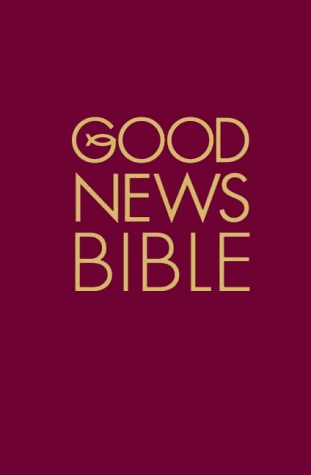
Good News Bible (GNB), also called the Good News Translation (GNT) in the United States, is an English translation of the Bible by the American Bible Society. It was first published as the New Testament under the name Good News for Modern Man in 1966. It was anglicised into British English by the British and Foreign Bible Society with the use of metric measurements for the Commonwealth market. It was formerly known as Today's English Version (TEV), but in 2001 was renamed the Good News Translation in the U.S., because the American Bible Society wished to improve the GNB's image as a translation where it had a public perception as a paraphrase. Despite the official terminology, it is still often referred to as the Good News Bible in the United States. It is a multi-denominational translation, with editions used by many Christian denominations. It is published by HarperCollins, a subsidiary of News Corp.
The LDS edition of the Bible is a version of the Bible published by the Church of Jesus Christ of Latter-day Saints in English, Spanish, and Portuguese. The text of the LDS Church's English-language Bible is the King James Version, its Spanish-language Bible is a revised Reina-Valera translation, and its Portuguese-language edition is based on the Almeida translation. The editions include footnoting, indexing, and summaries that are consistent with the doctrines of the LDS Church and that integrate the Bible with the church's other canonized Latter-day Saint scriptures. The LDS Church encourages its members to use the LDS Church edition of the Bible.

A Protestant Bible is a Christian Bible whose translation or revision was produced by Protestant Christians. Such Bibles comprise 39 books of the Old Testament and 27 books of the New Testament, for a total of 66 books. Some Protestants use Bibles which also include 14 additional books in a section known as the Apocrypha bringing the total to 80 books. This is in contrast with the 73 books of the Catholic Bible, which includes seven deuterocanonical books as a part of the Old Testament. The division between protocanonical and deuterocanonical books is not accepted by all Protestants who simply view books as being canonical or not and therefore classify books found in the Deuterocanon, along with other books, as part of the Apocrypha. Sometimes the term "Protestant Bible" is simply used as a shorthand for a bible which contains only the 66 books of the Old and New Testaments.
John Kelly LL.D. was a Manx scholar, translator and clergyman.
The Bible was translated into the Manx language, a Gaelic language related to Irish and Scots Gaelic, in the 17th and 18th centuries.
The New Testament was first published in Scottish Gaelic in 1767 and the whole Bible was first published in 1801. Prior to these, Gaels in Scotland had used translations into Irish.
References
- 1 2 "PHILIP MOORE (b. 1705, d. 1783)". A Manx Notebook. Retrieved 13 November 2020.
- ↑ "Reverend Philip Moore". Imuseum - Manx National Heritage. Retrieved 13 November 2020.
- ↑ "An Account Of The Translation And Editions Of The Holy Scriptures In The Manx Language". A Manx Notebook. Retrieved 13 November 2020.